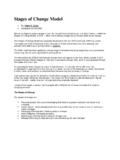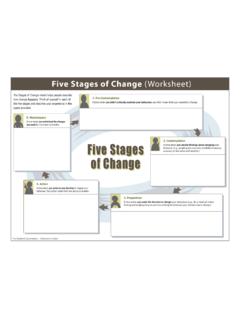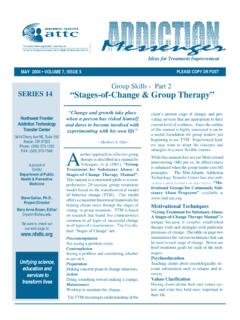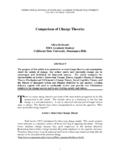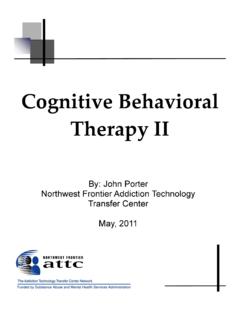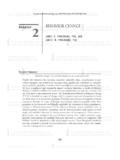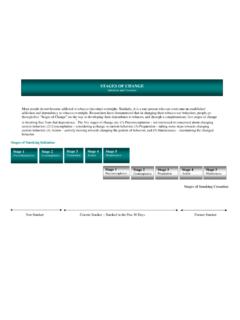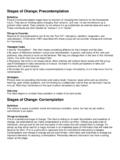Transcription of INTIMATE PARTNER VIOLENCE AND STAGES OF CHANGE
1 INTIMATE PARTNER VIOLENCE AND STAGES OF CHANGE A WORKSHOP FOR THE MARYLAND HEALTH CARE COALITION AGAINST DOMESTIC VIOLENCE Andrea C. Gielen, ScD, ScM Professor and Director Johns Hopkins Center for Injury Research and Policy November 5, 2015 Objectives Explain how a STAGES of CHANGE model can apply to help IPV survivors end abuse Understand how knowledge of survivors progress through STAGES of CHANGE can facilitate counseling Discuss the pros and cons of offering stage based counseling to IPV survivors identified in health care settings Ecological approach to health promotion Intrapersonal Interpersonal Public Policy Organizational Community a conceptual framework designed to draw attention to individual and environmental determinants of behavior. McLaren and Hawe, 2005 Ecological Models An organizing heuristic or framework that encourages consideration of multiple levels of influencing factors when trying to understand and CHANGE behavior To be successful at health behavior CHANGE , you need to think ecologically about the behavior you are trying to help people CHANGE Different behavior CHANGE theories are helpful at different levels of the ecological model We are going to explore TTM, which is typically used when working at the individual (intra and interpersonal levels)
2 Precontemplation Contemplation Preparation Action Maintenance TerminationThe TTM STAGES of CHANGE TTM STAGES Precontemplation No intention to take action within the next 6 months Contemplation Intends to take action within the next 6 months Preparation Intends to take action within the next 30 days and has taken some behavioral steps in this direction TTM STAGES - continued Action stage Changed overt behavior for less than 6 months Maintenance stage Changed overt behavior for more than 6 months Termination stage No temptation to go back to the old behavior and 100% confidence Activity 1 Think about the women IPV survivors you have worked with. How do you think the STAGES of CHANGE apply to them? The WISH Project Women s Initiative for Safety and Health Addressing INTIMATE PARTNER VIOLENCE in the Health Care Setting Co-Investigators: Andrea Gielen, Jessica Burke, Samantha Illangasekare, Patricia Mahoney, Karen McDonnell, Patricia O CampoThis work funded by the National Institutes of Mental Health and the Centers for Disease Control and PreventionResearch Phases Phase 1 Is the TTM an appropriate theory to address IPV?
3 Phase 2 How do we appropriately stage women for intervention and evaluation purposes? Phase 3 How do women respond to a stage -based intervention? Phase 1: Qualitative Research 78 women currently or recently in abusive relationship Broad, open-ended to explore whether STAGES emerged questions about their experiences of abuse 23 women currently or recently in abusive relationship Talk through relationship, starting when problem was recognized to explore processes, self efficacy, decisional balance Interviews audio-taped, transcribed, and coded Precontemplation The woman does not recognize the abuse as a problem and is not interested in CHANGE . Well, basically, you know, when we first started seein each other I didn t, I won t say I didn t detect some obsessiveness , but I kinda wore the flower colored glasses. Then I was like, Oh well, you know, he just cares about me kinda thing.
4 Contemplation The woman recognizes the abuse as a problem and has an increasing awareness of pros and cons of CHANGE . [I recognized the abuse as a problem when] the hits got more wasn t a slap or something. Preparation The woman recognizes the abuse as a problem, intends to CHANGE and has a developed a plan. I [can t leave the abusive situation], not like right now but as soon as I get myself together where I can stand on my own two feet without needing anybody to help me then I ll be I ve been trying to find a job. Action The woman is actively engaged in making changes related to ending the abuse. I got tired of getting my tail whipped, you know. That s when my sister said I could come stay with her. I got tired of it, that s why I left. I got tired of getting beat on. I got tired of feeling like I was to blame. I got tired of being cussed I had to get ex-parte orders to keep him away from me because he was very abusive.
5 He would fight me and put holes in the walls and he was mean. He did mean things. Maintenance The abuse has ended and the woman is taking steps to prevent relapse. I wouldn t have never took him back. Never look back. I see myself now as just struggling and taking it day by day [after having left him]. Doing the right thing. No man out there that can put his hands on me again. It ll never happen. I refuse to let any man, woman, child, whatever, any human being hurt me again. Because I ve been hurt too much and I feel good about myself today. Activity 2 How do you think you can help women progress through the STAGES of CHANGE ? What interventions have you seen that have been successful and with women in what STAGES ? STAGES and Processes of CHANGE PrecontemplationContemplationPreparation ActionMaintenanceSelf ReevaluationSelf LiberationReinforcement ManagementHelping RelationshipsCounter-conditioningStimulu s ControlProchaska, , DiClemente, and Norcross, (1992).
6 In search of how people CHANGE applications to addictive behaviors. American Psychologist, 9 RaisingDramatic ReliefEnvironmental EvaluationSocial LiberationAlso needed to achieve CHANGE Decisional Balance Process of weighing the pros and cons of behavior CHANGE Self Efficacy Confidence in one s ability to make a behavior CHANGE Consciousness Raising Process of seeking new information and gaining a better understanding of the abuse. [I recognized the abuse] believe it or not when Oprah [the talk show host] was having a lot of things on abusive relationships, and then I started identifying with some of the things and then I started reading. Environmental Reevaluation Process of assessing how the abusive behavior affects one s environment. when he started talkin nasty in front of my children and my son wanted to fight him, that s when I was thinking of that really pushed me to make a decision.
7 Helping Relationships Process of trusting, accepting and utilizing support of caring others during attempts to end the abuse. my mother and them used to say, leave this man alone ..but I ain t want to hear it. Nobody could tell me nothing. I didn t want to hear it, but I knew it was the truth. It was just accepting it that took a while. Other factors that facilitate CHANGE Decisional Balance -- Pros > Cons of CHANGE PROS = concerns about personal and children s safety CONS = financially and emotionally dependent upon PARTNER Self Efficacy -- Confidence in ability to CHANGE I m very confident now that I can stay free from it [the abuse]. If I get even one sign from this guy [new PARTNER ], he s gone. Intervention Needs by stage stage of CHANGE Intervention Needs Precontemplation Increase awareness of need for CHANGE Personalize risks and benefits Contemplation Motivate Encourage to make specific plans Preparation Assist in developing concrete action plans Help to set gradual goals Action Assist with feedback Help to problem solve Provide social support and reinforcement Maintenance Assist in coping Provide reminders Engage in helping others From Phase 1 to Phase 2 Women s stories are consistent with STAGES and CHANGE constructs Can we measure STAGES so that we can tailor interventions and evaluate them?
8 Phase 2: Quantitative Research One hour face-to-face interview with 96 women Had experienced IPV within the past year Recruited from health care settings Sample Characteristics, N=96 % Age Mean = Range = 20 - 54 African American 83% Unemployed 81% High school graduate 58% HIV-positive 27% Experienced severe abuse in past 6 months 62% Used safety planning in past 6 months 95% STAGES of Leaving % Together, no plans to leave 22% Together, plans to leave in next 6 months 30% Apart, less than 6 months 22% Apart, 6 months or more 26% Helping women stay safe/end abuse Majority of women were actively coping using a variety of safety plan behaviors Generally the personal behavioral (avoided PARTNER , hid things) were more common than the environmental (police, sought education/job) Desired multiple types of services, including all levels of the ecological model (information, hot line, counseling, legal advice, housing, etc.)
9 From Phase 2 to Phase 3: Project WISH intervention development and testing Women desire a wide array of services and are at various STAGES of deciding about leaving their abuser Can tailored counseling and referral address these needs? WISH Counseling Curriculum A counseling program for women experiencing INTIMATE PARTNER VIOLENCE 8 session individual counseling program delivered by a masters prepared counselor Based on the STAGES of CHANGE Objectives of WISH To improve physical and mental health and health-related quality of life for women experiencing IPV To help women make informed decisions about their abusive relationship and personal safety To increase safety behaviors and coping strategies, reduce IPV and facilitate stage movement towards ending an abusive relationship To increase self efficacy, decisional balance and use of processes of CHANGE Content and Methods of WISH Curriculum Individually tailored to women s stage of readiness to end an abusive relationship, her current level of IPV risk.
10 And her personal goals Includes a series of counseling activities designed to address cognitive and emotional aspects of living with IPV encourage safety planning and crisis intervention enable the use of personal and community resources for women who are ready to take action to CHANGE their circumstances stage COUNSELING ACTIVITIES INFLUENCING FACTORS PRECONTEMPLATION Does not want to end the or is unsure : To make an informed decision about whether to end to Self- Talk Weighing Advantages/Disadvantages Check What You Know Red Flags Who Knows Self- Efficacy Decisional Balance Processes of CHANGE Consciousness raising Environmental WISH Counseling Activities Check what you know Read a list of statements to client and ask her which are true and which are false in order to stimulate discussion about VIOLENCE and abuse [Consciousness Raising] Building Skills Brainstorm a list of things that tend to cause/escalate the abuse.
